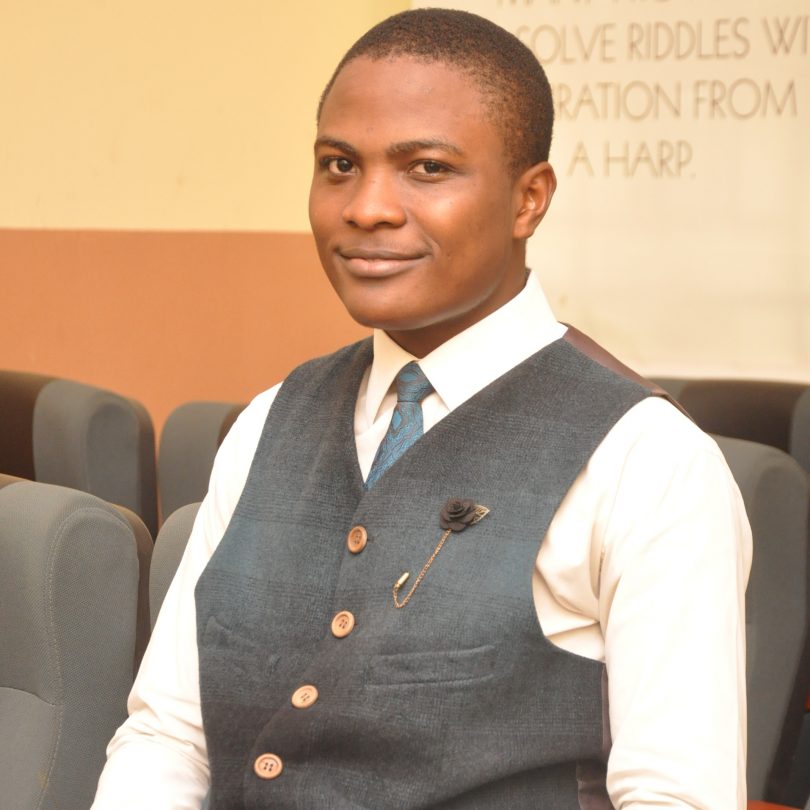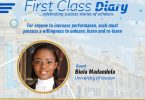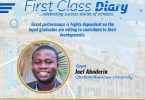Hello everyone! How are you doing this morning? Trust you had an amazing weekend. My scholar for this episode is an amazing young champ.
He was the Valedictorian for the 2018/2019 graduating set of Mountain Top University. It is my pleasure to introduce to you Babalola Benjamin Ayodipupo, a Biochemist with the sauce.
In his words,
There is an innate performance in every competence; therefore, a person who is loaded can never be useless. On critical evaluation, analysis and insight, the average Nigerian graduate is a First-Class Performer
Babalola’s interview is really an interesting read with so many eye openers. Enjoy!
Abigael Ibikunle of Edugist: Please share with Edugist, a little about your background.
Babalola Benjamin: I am Babalola Benjamin Ayodipupo, a native of Ekiti State. I am the fourth child of my family. I became a Choir Master at the age of 16; I acknowledge my Father who encouraged my path to classical music.
Also, I attended the Federal Science and Technical College, Yaba, Lagos, where I graduated also as the Class Valedictorian and was awarded the Best in WAEC.
AI: Was there any motivating factor(s) that influenced your choice of discipline and institution?
BB: Well, yes! The journey was divinely orchestrated. Some years back, there was a restructuring as to what God wanted for me from my passion. As a young boy then, I was passionate about being a Medical Doctor. I was admitted into the University of Lagos Foundation Programme in Medicine and Surgery.
Although, I finished with the requisite point- a perfect CGPA of 5.0, I was not admitted into the programme. At this time, I had to pray to God for His purpose for my life. My admission as a Direct Entry Student into the Mountain Top University was divinely composed. I chose Biochemistry as I understood its significant role in health, biological and nutritional sciences.
Moreover, on my quest to comprehend the chemistry behind health challenges, I opted in for the course. By God’s grace, I finished also as the Class Valedictorian with a perfect CGPA of 5.0/5.0.
AI: There are two major skills that every student must possess: COMPETENCE and PERFORMANCE. While competence revolves around skill acquisition, performance is much more concerned about skills application. It is believed that most graduates are competent because their academic performance testifies to this. But they are performance-challenged. This poor performance ipso facto hinders them from getting lucrative jobs in the labour market. What can you say about this assertion?
BB: Past studies corroborate that, while ample knowledge on a choice of discipline is possessed by a larger percentage of Nigerian graduates, there is a rising deficiency on the necessary application associated with it. I have a mixed opinion on the aforementioned proclamation. I feel the statement is somewhat realistic but not to an extent too accurate.
The Nigerian Institution is doing a lot to bridge the gap between theory and practise. On critical evaluation, it is evident that the Nigerian graduate is globally-competitive and industrially-relevant in the world market. In recent times, for example at the Mountain Top University, mandatory practical sessions are being conducted for every on-class knowledge gained. This way, knowledge on the environment around us is made less abstract.
Also, that most Nigerian Undergraduates have to gain at least a 6-month internship experience in line with their field curtails the challenge in performance. Another way Institutions enhance skills acquisition and application is through Research projects. Before a student graduates, he must have either added to knowledge or solved a societal problem by making deep enquiries on his field.
There is innate performance in every competence; therefore, a person who is loaded can never be useless. On critical evaluation, analysis and insight, the average Nigerian graduate is a First-Class Performer
However, there are some factors which might be staged as a hindrance. These factors are responsible for the drift in purpose and focus of students. It causes short-sightedness in the academic vision. But for those who are dogged in their pursuit for excellence, the hurdles surely will be overcome.
AI: What do you think is responsible for competence without performance? Please suggest ways of improving the performance level of university students and graduates
BB: First, the government of a system. A linear relationship exists between the level of development of a system and the degree of performance. In a more developed and organized governance (from the governmental to educational scale) there is higher potency to the application of knowledge gained.
For example, in developed countries, right decisions through research is what drives them. They fund academic research heavily in order to solve societal problems. Why are practical sections, internships and research in those areas taken seriously? I suggest that good governance cuts across all scale in order to ensure performance.
Also, when instructors lack proper skills on a course of study, you do not expect the students to know more. If students can go out of their comfort zone, this challenge will be overcome.
For example, IT skills such as Machine learning, Mobile development, Cyber-security, Data Engineering, UI/UX design, etc., might not have had a thorough practical approach in a University where computer science is taught.
I, however, suggest the Government make higher institutions research-intensive and more practical-based. Instructors should always update their skills for effective delivery as well.
In addition, it is sad to note that students in some areas never get to practice what they have learnt. Some institutions teach a lot of theory but never carry out what has been taught. Equipping schools with modern learning aids will be a great approach to solving this challenge.
Moreover, lack of interest and lackadaisical attitude from students could be a reason to competence without performance.
Academic under-achievement will utterly be translated into an under-performance. When a person does not project into the future and what it holds, then abuse of such opportunity is inevitable. Therefore, it is advised that students remain focused.
AI: Achievement in life transcends one’s personal efforts. There were people who, during your programme, rendered some assistance that made your dreams a reality. Who are specific persons whose contribution you can’t forget in your first-class feat?
BB: First, my Family. While my Mother served as a drive to do more, my Father was a source of encouragement. He rewarded and celebrated academic excellence right from our primary school days. Also, my siblings played a role; my eldest sister was the Valedictorian of Crawford University, Ogun State in 2012, and this served as a motivation since then.
Second, the DKO Foundation Scholarship which I was awarded, spurred me to do better. And even to replicate the philanthropy in my own little way. It engendered financial-relief also in the family. Also, personalities like Professor Amos Akinwande, Dr. Adesina Adeiga, Dr Otunba Adebisi, Dr Akinyemi Akinyugha, Dr. Isaac Akinbulu, Mr. Gboyega Adebami, Mr. Bamidele Salami, Dr. Gbenga and a lot more not mentioned, played a great role.
They were always there to advice, mentor and encourage during the academic journey. Lastly, my inspiration to achieving the perfect CGPA of 5.0 was Ayodele Dada Daniel who achieved a similar feat at the University of Lagos during the year of my Foundation programme in the same University.
AI: As a first-class graduate, are you currently gainfully employed?
BB: Well, yes. I am currently serving the country.
AI: Do you think your grades have or is giving you any major advantage over other graduates with lesser grades?
BB: I will say that I have received favour from God and man.
AI: For students who aspire to graduate with outstanding grade like yours, what would you advise them?
BB: First and foremost, they must develop the consciousness and mind-set that there is nothing impossible to achieve. And there is nothing too difficult. In the dictionary of achievement, there is nothing as impossibility.
Also, they must have a high resolute to focus. They must know what they want and make sure it is achieved. Determination, diligence, proper time management, humility, proper study and discipline are essential ingredients to academic success.

I wish I found someone to tell me what I will be giving now on a platter of gold. I call it
“The Eleven Ancient Wisdom Every Student Should Know:”
- Early and adequate preparation are keys to the door of success.
- Sleep and laziness are intelligent robbers of success and great achievements.
- Success without the right procedures is like a tree without a root.
- The seed of success in a poorly cultivated mind will not grow.
- Dishonesty is a recipe for academic embarrassment.
- Never blame where you are coming from; rather, focus on where you are going to.
- The bigger the vision, the higher the hurdle.
- Distractions on the road to success might land a person in the pit of failure.
- The more friends you have, the successful you become is a fallacy.
- When preparation is done in silence, success is louder.
- Success comes with persistence, hard work and endurance.
AI: What would you advise the government to do to improve the standard of our education system?
BB: From the actions of TetFund and other Government Institutions, it can be said that the Nigerian Government is working to improve the educational system. Upon this, there are still identifiable loopholes.
These 11 strategies to improving the standard of the educational system, if followed will engender a transformation in the Nigerian Educational System:
- Re-structuring of the National Policy on Education. An understudy of the working educational system of other parts of the world needs to be done to align and if possible, surpass them.
- Increasing the budget and funding to the education sector. In 1991, it was recommended by the UNESCO that 26% funding is allocated the sector but since then, it never crossed 10%. This needs to be critically looked into.
- There should be a developed passion for the future of the younger generations and the future Nigeria by the Government. There is a cry for honesty and uprightness in our system.
- Quality education from the primary to the higher learning level should be established.
- Providing a standardized and recognized scheme for reward of academic excellence. Students, this way, will fix their eyes on the prize and be dogged in their pursuit for excellence. The consequence of this will be the production of globally-competitive graduates.
- Provision of scholarships and financial aids at every level of study.
- Discouraging and the eradication of examination malpractice. This could occur through re-orientation of the community consisting of Parents, Teachers and Students.
- Proper and up-to-date equipping of secondary school laboratories and classrooms. Modern sophisticated learning/teaching aids should be provided.
- Universities should be made research-intensive. An approach to this is via funding; research should be a driver of the economy.
- There is also a call for improvement in the welfare of Teachers in terms of salary and a suitable working environment. This encourages effective delivery.
- It is sad to know that some knowledge disseminated in this dispensation are obsolete. There should be an incessant review of curriculums used in institution.
AI: Any other thing you would like to share?
BB: Divine intervention is required when the road to success seems to be unusually rough. The potency of the power of prayer is real. Also, it is an aberration to succeed on earth and fail in the things of God. Our focus should not just be on earthly entities.
Many thanks for reading this interview. I’d love to hear from you! Comments, suggestions or even reach out to me on abigail@edugist.org or +2347035835612 if you know a scholar that needs to be featured. Let’s keep celebrating success and encouraging our scholars.
Thanks for joining us today, I remain your host, Abigael Ibikunle. See you next week!








